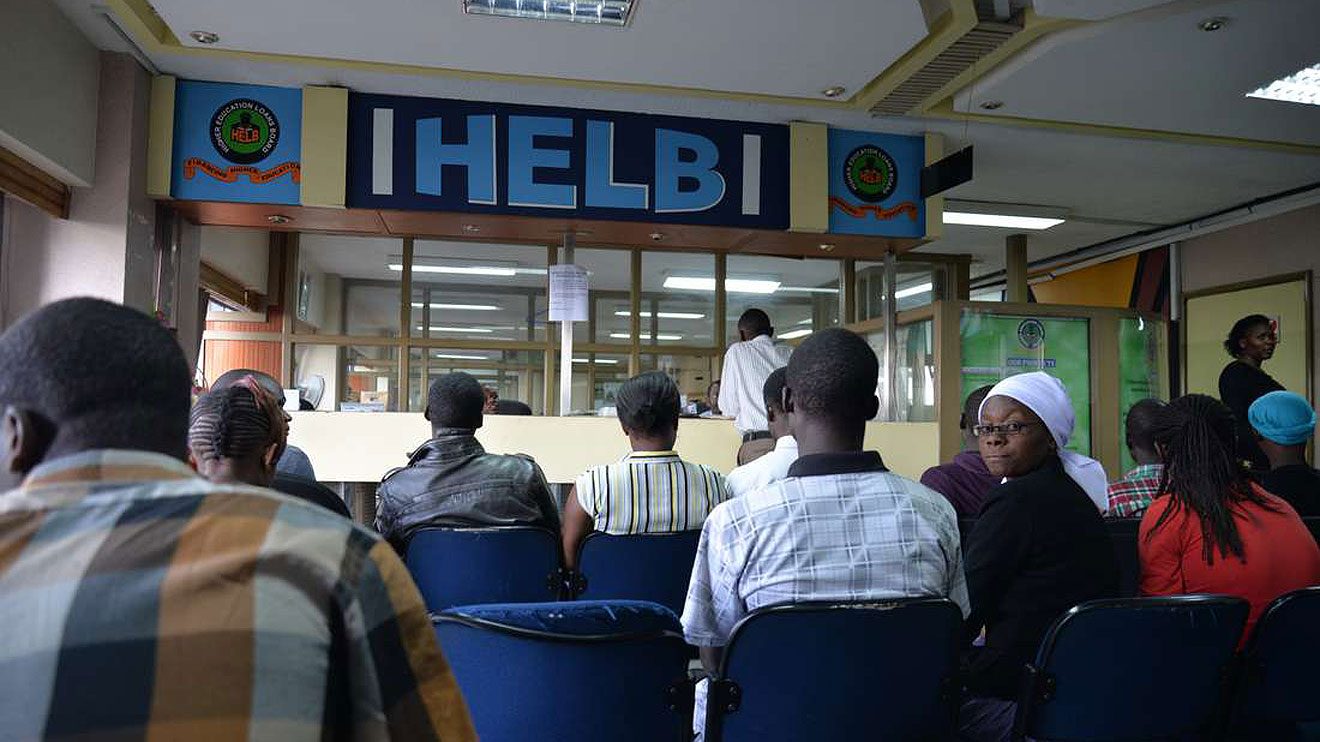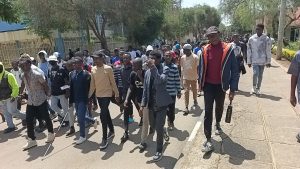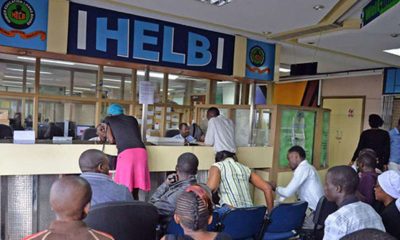News
HELB To Disburse Funds Under Old Model After Students Storm Anniversary Towers

The Higher Education Loans Board (Helb) has announced that first and second-year university students will continue receiving funds under the previous funding model as the agency awaits the outcome of an appeal challenging the High Court’s suspension of the new framework.
The announcement follows a wave of student protests across different institutions, with demonstrators demanding the immediate release of their loans. On Monday, learners from Egerton University and the University of Nairobi stormed Helb’s headquarters at Anniversary Towers in Nairobi, decrying the delay.
Police swiftly intervened to disperse the protesting students and secure the premises, aiming to prevent disruptions within the Central Business District (CBD).
The demonstration comes two weeks after University of Nairobi students issued a seven-day ultimatum on January 14, demanding that the government resolve the delays or face mass protests.
The students decried the prolonged wait for funds, which they heavily depend on for tuition, accommodation, and daily expenses, saying the delays had pushed many into financial hardship.
Addressing the media outside Helb offices, Egerton University students issued a 12-hour ultimatum to the agency, warning of heightened action should the funds remain undisbursed. They further warned that failure to comply would result in a nationwide shutdown.
“We urge the government, the Ministry of Education, to disburse the Helb funds to comrades. We are just giving you an ultimatum of 12 hours to do something. We are tired,” Egerton University student leader Teddy Odhiambo said.
“We will shut the country down if Helb will not have disbursed the loans in 12 hours. We are sleeping hungry, we have not paid fees, we are depressed and the government is doing nothing. We have rent arrears, we can’t afford meals, and our academic progress is at risk. HELB is our lifeline, and these delays are unacceptable.”
Thika Superhighway demos
Meanwhile, Kenyatta University students staged demonstrations along the Thika Superhighway, blocking a section of the busy road and causing a major traffic snarl-up. The protest came barely a week after a similar demonstration by the same group.
The Higher Education Loans Board has since attributed the disbursement delays to budgetary constraints, increased demand for financial aid, and challenges in recovering loans from previous beneficiaries.
As a result, it noted that the first and second-year students will be funded using the differentiated unit cost model, similar to how third and fourth-year students are supported.
Addressing the complaints, Helb Lending Manager King’ori Ndegwa revealed that Sh3.1 billion had already been released, with approximately 180,000 students still awaiting their disbursements.
The disbursement delays stem from a court decision that halted the implementation of the new funding model, compelling Helb to temporarily revert to the old system until the legal battle is resolved.
On December 20, 2024, the High Court nullified the government’s university education funding model, declaring it unconstitutional and discriminatory. Delivering the ruling, Justice Chacha Mwita stated that the model had been implemented without adequate public participation, violating students’ legitimate expectations.
“The government has a constitutional responsibility to fund public universities. Passing this burden onto parents is a violation of the Constitution,” he said.
He further ruled that public consultation should have been conducted to incorporate citizens’ views before the model was introduced.
“The changes in the funding model did not adhere to the necessary legal provisions in its creation,” he noted.
Court directive
The court directed the Education Cabinet Secretary, Attorney General, Higher Education Loans Board (Helb), and other relevant bodies to halt the implementation of the model.
The ruling followed a petition filed on October 13, 2023, by the Kenya Human Rights Commission (KHRC), Elimu Bora Working Group, Boaz Waruku, and a Students Caucus. The petitioners argued that the new model locked out thousands of students from accessing higher education, making it discriminatory and a violation of the right to education.
The Variable Scholarship and Loan Funding (VSLF) model, launched by President William Ruto in May 2023, categorised students into five financial bands, with those from vulnerable and extremely needy households eligible for full funding, while those considered less needy could receive up to 90 per cent funding.
On October 3, 2024, the High Court had issued conservatory orders suspending the model pending the hearing of the petition. At the time, the court faulted delays by the Attorney General, Education Cabinet Secretary, and the Kenya Universities and Colleges Central Placement Service (KUCCPS) in filing their responses, which had stalled the case.
“Pending the inter-partes hearing, conservatory orders are issued against the respondents, their servants, agents, and employees from implementing the new education funding model until the petition is heard and determined,” the court ruled then.
In mid-January, the Universities Fund and Helb filed an appeal against Justice Mwita’s ruling, arguing that he had erred in both law and fact. They stated that the judgement had made it impossible to disburse funds to universities and students, particularly first and second-year learners, who were the primary beneficiaries of the nullified model.
Universities Fund CEO Geoffrey Monari, in his affidavit, maintained that the funding model had been implemented after extensive public participation and ensured equity and equality, unlike the previous system, which focused solely on quality. He warned that the ruling could create a financial stalemate in the higher education sector.
Monari also defended the outlawed model, arguing that it was more cost-effective and efficient in financing university education.
Helb Acting CEO Mary Muchoki echoed similar concerns, stating that the ruling had made it impossible for the loans board to disburse funds, leaving universities at risk of immediate and indefinite closure.
Kenya Insights allows guest blogging, if you want to be published on Kenya’s most authoritative and accurate blog, have an expose, news TIPS, story angles, human interest stories, drop us an email on [email protected] or via Telegram
-

 Business1 week ago
Business1 week agobetPawa Empire Crumbles: Mr Eazi’s Betting Gambit Unravels Amid Partner’s Shadowy Deals
-

 Business6 days ago
Business6 days agoMinnesota Fraud, Rice Saga, Medical Equipment Deal: Why BBS Mall Owner Abdiweli Hassan is Becoming The Face of Controversial Somali Businessman in Nairobi
-

 News7 days ago
News7 days agoDCI Probes Meridian Equator Hospital After Botched Procedure That Killed a Lawyer
-

 Business2 weeks ago
Business2 weeks agoKRA Boss Humphrey Watanga In Big Trouble In Sh5.5 Billion Rice Import Scandal
-

 Investigations2 weeks ago
Investigations2 weeks agoKERRA Homa Bay Region Manager Calvince Thomas Accused of Swindling Businessman Ksh 2 Million in Phantom Tender Deal
-

 Politics6 days ago
Politics6 days agoYour Excellency! How Ida’s New Job Title From Ruto’s Envoy Job Is Likely to Impact Luo Politics Post Raila
-

 Business1 week ago
Business1 week agoState Set to Demolish Pastor Ng’ang’a’s Church in Sh28 Billion Railway City Push
-

 Investigations1 week ago
Investigations1 week agoEXPOSED: SHA Officials Approve Higher Payments for Family, Friends as Poor Patients Pay Out of Pocket























